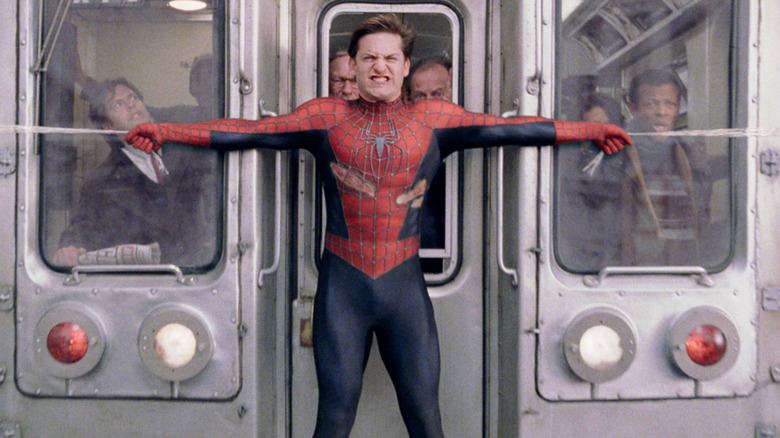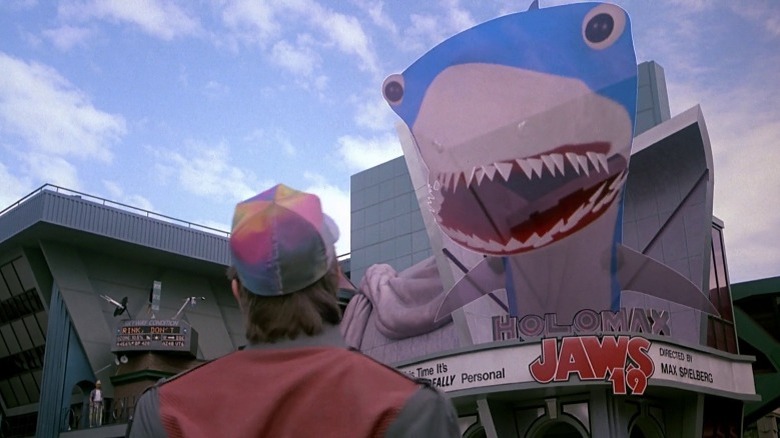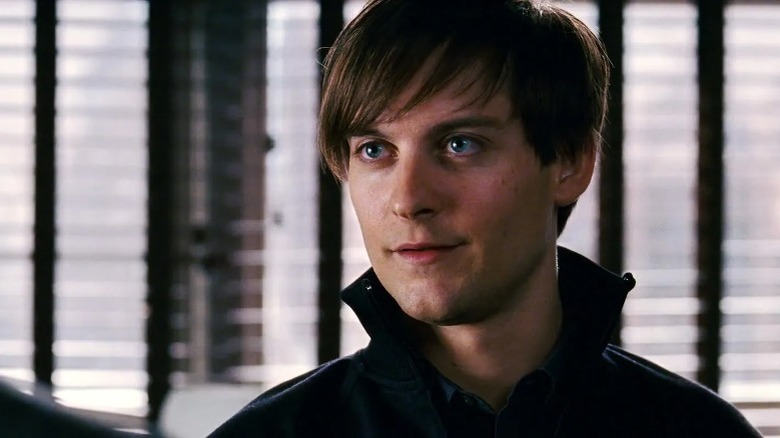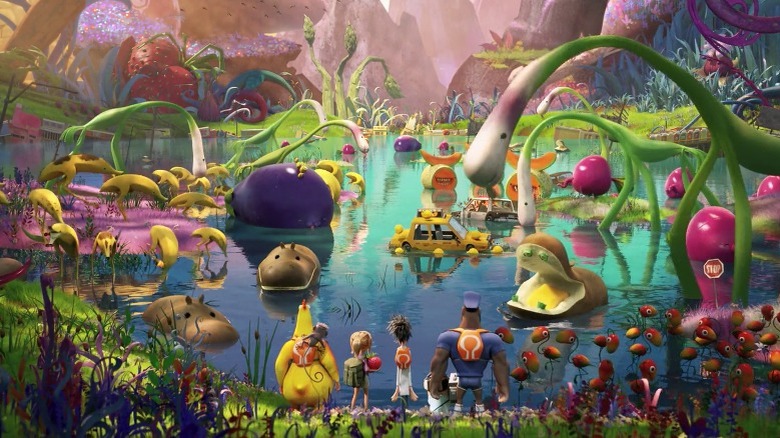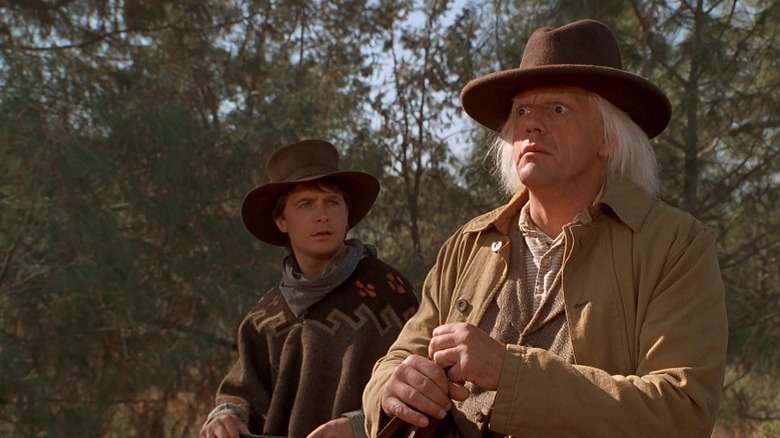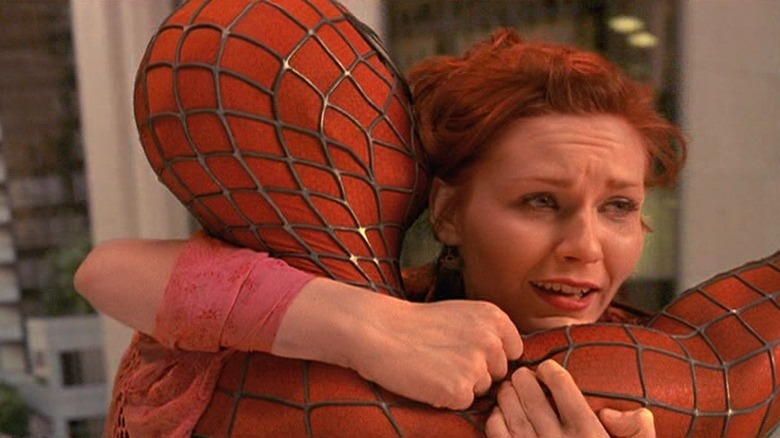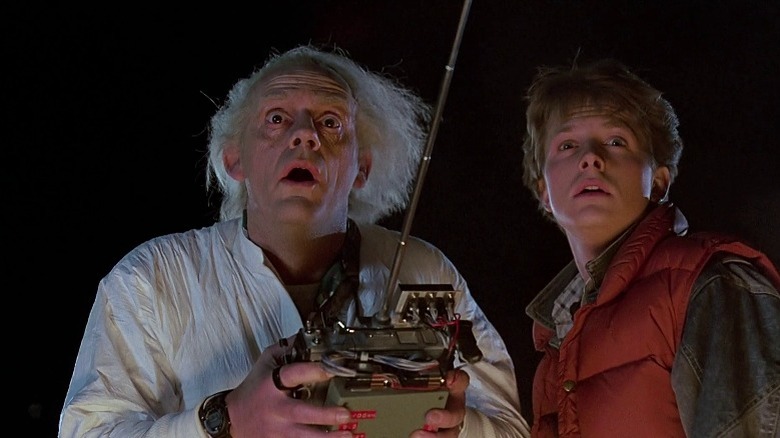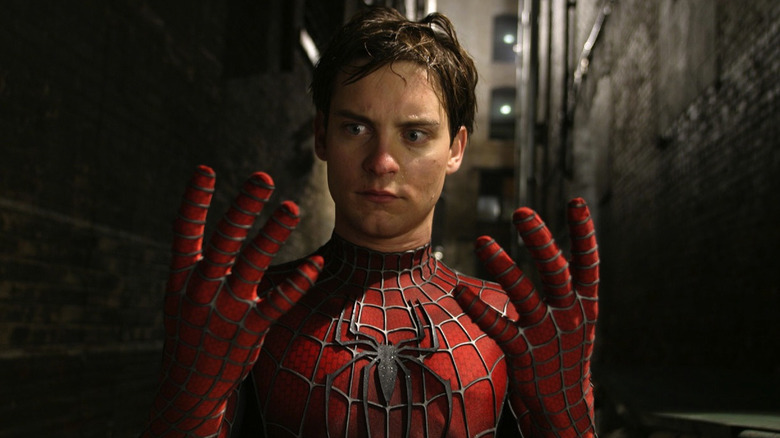Sci-Fi Movies Coming To Netflix July 2024, Ranked By Rotten Tomatoes Score
July 2024 is going to be a bustling month on Netflix, with over 50 movies scheduled to hit the streamer's library in the United States. As ever when it comes to Netflix, the incoming titles will generally skew mainstream and recent, but they still cover a wide array of genres and countries — and sci-fi fans will find plenty of good stuff to dig into in that new batch.
The selection of science fiction titles coming to Netflix this July (not counting new originals) will include seven total movies, with six of those movies hailing from two enormously popular trilogies that are set to be made available in full on the service. The seventh one, meanwhile, is a sequel to a popular animated film that Netflix currently doesn't have. But as frustrating as that impracticality is always wont to be, the sequel in question is fun and self-contained enough to be enjoyed on its own.
In fact, all seven sci-fi movies about to hit Netflix can be said to have been critically well-received, only to different degrees. To assess those degrees, here's a ranking of them by Rotten Tomatoes critic score. While it should be noted that RT scores are determined by flat binary metrics, and therefore should be taken more as general surveys of overall critical popularity as opposed to criterion standards for intensity of acclaim, they're still helpful in painting a picture of how unanimously liked a movie is — and all seven movies here are liked enough to have garnered "Fresh" ratings.
7. Back to the Future Part II
It's not rare for second entries in famous sci-fi movie series to go down as highlights — just ask "The Empire Strikes Back," "Aliens," "The Road Warrior," or "Terminator 2." But, in the case of the "Back to the Future" trilogy, that's not quite how things shook out, as 1989's "Back to the Future Part II" is the least well-received installment by far.
Sitting at 63% on Rotten Tomatoes, with 40 positive reviews and 24 negative ones, the first sequel to "Back to the Future" brought back Robert Zemeckis and co-writer Bob Gale, yet critics found that the duo couldn't quite recapture the magic of the original film. Some major critics did like the movie — such as Roger Ebert, who admired its chaotic nature, writing admiringly that "'Back to the Future Part II' is an exercise in goofiness, an excursion into various versions of the past and future that is so baffling that even the characters are constantly trying to explain it to each other" (via RogerEbert.com).
Others, however, found that the goofiness in question didn't ultimately cohere into a film that was truly satisfying on its own. Chicago Reader's Jonathan Rosenbaum, for instance, wrote, "By the end, you may feel that you've just sat through a feature-length commercial for both part one (which has to be seen to make this sequel comprehensible) and part three (a trailer for it literally ends part two), along with a host of other consumables."
6. Spider-Man 3
One of the most controversial superhero films of all time, "Spider-Man 3" arrived in 2007 as a hotly-anticipated follow-up to two immensely popular and renowned tomes of the genre, with a hovering expectation that it would close out Sam Raimi's "Spider-Man" trilogy in spectacular fashion and send it off with a bang. As any pop culture connoisseurs who were riding the hype train at the time can attest, however, the final stop was a bit of a letdown for some.
Not for all, mind you. There are those who maintain, in retrospective assessments, that "Spider-Man 3" really isn't that bad, and the film had its share of defenders even at the time of release, adding up to a not-terrible 63% on Rotten Tomatoes from 166 fresh reviews and 97 rotten ones. Among those defenders was Salon's Stephanie Zacharek, who deemed "Spider-Man 3" as "a vast improvement" on "Spider-Man 2," one in which the writers "have taken care to give the relationships between the characters more tangible contours than in the last picture, and the actors give better performances as a result."
Less favorable was The New Yorker's Anthony Lane, who wrote that the film's problem was "not that it's running out of ideas, or lifting them too slavishly from the original comic, but that it lunges at them with an infantile lack of grace, throwing money at one special effect after another and praying—or calculating—that some of them will fly."
5. Cloudy with a Chance of Meatballs 2
2009 was arguably the most crowded year ever for English-language animated cinema, with powerhouses like "Coraline," "Up," "Fantastic Mr. Fox," "Mary and Max," "The Princess and the Frog," and "Mary and Max" all vying for critical attention and awards — such that the comparatively goofier and more self-effacing "Cloudy with a Chance of Meatballs," which first-time directors Phil Lord and Chris Miller joined when they still had no idea how to make a movie, got somewhat overlooked, despite being a great film in its own right. Still, it was financially successful enough to prompt a sequel, 2013's "Cloudy with a Chance of Meatballs 2" — which, while not quite as well-received as the original, still charmed critics enough for a 71% Rotten Tomatoes score with 87 positive reviews against 36 pans.
The prevailing sentiment among reviewers seemed to be that the second "Cloudy," while not the most necessary sequel in the world, was still pretty fun — as voiced by The Dissolve's Keith Phipps, who argued that the film "works anyway by providing more of the same — and then even more," and The New York Times' Miriam Bale, for whom "At times it felt as if this film might challenge Pixar's decade-long reign, but that promise wanes." Others, however, were not so impressed; The A.V. Club's A. A. Dowd, for one, wrrote, "Like too many sequels, this second helping of 'Meatballs' confuses bigger for better, piling on the action but misplacing much of the original's charm."
4. Back to the Future Part III
Although the "Back to the Future" series hit a bit of a rough patch in terms of critical reception in the second installment, it still managed to go out on a high note. With a tally of 38 positive reviews and just nine negative ones adding up to a 81% Rotten Tomatoes score, "Back to the Future Part III" was nearly as acclaimed as the first film; it could even be the best "Back to the Future" movie, depending on who you ask.
Funnily enough, the two great American critics who were on opposite sides regarding "Part II" found themselves at odds again over "Part III," this time with the sides reversed: Roger Ebert disliked the third "Back to the Future," writing (via RogerEbert.com), "It's as if Robert Zemeckis, who directed, and Bob Gale, who wrote, ran out of time travel plot ideas, and settled into a standard Western universe." Jonathan Rosenbaum, meanwhile, preferred it to its predecessor, finding it "a good deal more likable than part two because the product plugs have been held back, and Zemeckis is clearly having fun alluding to his favorite westerns" (via Chicago Reader).
Adding to the positive chorus was Los Angeles Times' Peter Rainer, who found the film to fix problems in "Part II," writing that "for those who care, it satisfyingly ties up the various plot strands that were flapping in the breeze from the last installment. 'Back to the Future' futurists will feel complete."
3. Spider-Man
Back in the early 2000s, long before superhero movies were crying out for a nice, long break for their own good, movie critics were still feeling their way through the 21st-century blockbuster landscape that made them ubiquitous. It was an era of critical hits and flops, and an early positive benchmark to be elected for the genre was 2002's "Spider-Man" — the first-ever big-screen Spidey venture, if you can picture that. While not quite the most acclaimed film in Sam Raimi's trilogy — more on that in a minute — the unexpectedly soulful and thoughtful franchise-starter managed to impress critics with the new moves it brought into superhero cinema.
Out of 249 critic reviews on Rotten Tomatoes, 224 are positive and 25 are negative, which is enough for an impressive 90% rating. In an ecstatic review, the Washington Post's Stephen Hunter called the film "an exuberance, a celebration, a hoot, a kick and a half," and waxed poetic about its web-swinging imagery: "What ['Spider-Man'] gets most and best ... is the sheer joy of movement in defiance of gravity, both literally and as metaphor" for "the most yearned-for of adolescent needs, resonant and poignant at once, denied by society, parents, peers, civilization even — freedom of the self."
Even reviewers who weren't as wowed by the spectacle still found themselves taken with Raimi's focus on the human element, with the Philadelphia Inquirer's Carrie Rickey writing that the film's "superheroics are gung-hokum beside the saga of one teen's hunger for visibility, validation and love."
2. Back to the Future
It might have taken a while for Christopher Lloyd to realize its impact, but, sure enough, "Back to the Future" ultimately went down as a classic — and its critical reception still ranks among the most rapturous ever for the sci-fi genre.
On Rotten Tomatoes, there are 103 positive notices and 8 unfavorable ones, resulting in a whopping 93% score. Back in 1985, Janet Maslin's enthusiasm allowed her to venture a winning prediction in The New York Times: "[Robert Zemeckis] handles 'Back to the Future' with the kind of inventiveness that indicates he will be spinning funny, whimsical tall tales for a long time to come." Gene Siskel, typically wary of blockbusters, also bowed, writing for the Chicago Tribune that "this seeming kids' movie full of screeching cars, special effects and lightning storms, is nothing less than an adult reverie. And if families could be persuaded to see this film together, it might touch off a long night of sharing between parents and children." Retrospective reviews have been similarly glowing.
Not all were so enthusiastic, however. Although her review is counted as "Fresh" on RT — and mistakenly yoked to an excerpt from another not-impressed review, by the Atlanta Constitution's Eleanor Ringel — the great Pauline Kael took issue with the film's plays for mass commercial appeal. "Despite Zemeckis and Gale's wit in devising intricate structures that keep blowing fuses, the thinking here is cramped and conventional," she wrote for the New Yorker (via Scraps from the Loft).
1. Spider-Man 2
There's a case to be made for "Spider-Man 2" as the best superhero movie of all time; at the very least, it ranks among the most acclaimed — up there with genre monuments like "The Dark Knight," "The Incredibles," "Black Panther," and the original 1978 "Superman." As a case in point, its score of 93% on Rotten Tomatoes – currently higher than "Back to the Future'" by mere decimal places to put it at the top of this ranking.
You know you're dealing with an extraordinarily well-liked film when, out of 277 counted reviews, a mere 19 are rotten, while the other 258 are fresh. In fact, "Spider-Man 2" can also claim the rare feat of having a "Top Critics" score that's even higher than the general score, with 57 of 59 highlighted critics (that's about 97%) giving it approving notes. For Las Vegas Mercury, Jeannette Catsoulis wrote, "Sam Raimi's reverent realization of Stan Lee's comic-book vision makes the fantastic achingly human."
Entertainment Weekly's Lisa Schwarzbaum argued that it "may be the first great comic-book movie in the age of self-help and CGI wizardry, an entertainment in which both the thrills and the therapeutic personal growth are well earned." The Seattle Times' Moira Macdonald, meanwhile, praised the movie's plethora of pleasures: "Take out the love story and you'd still have a nifty action flick; delete the special effects and a beautifully acted romance would remain. Put it all together and ... hey, it's going to be a 'Spider-Man' summer." Indeed, it was.
